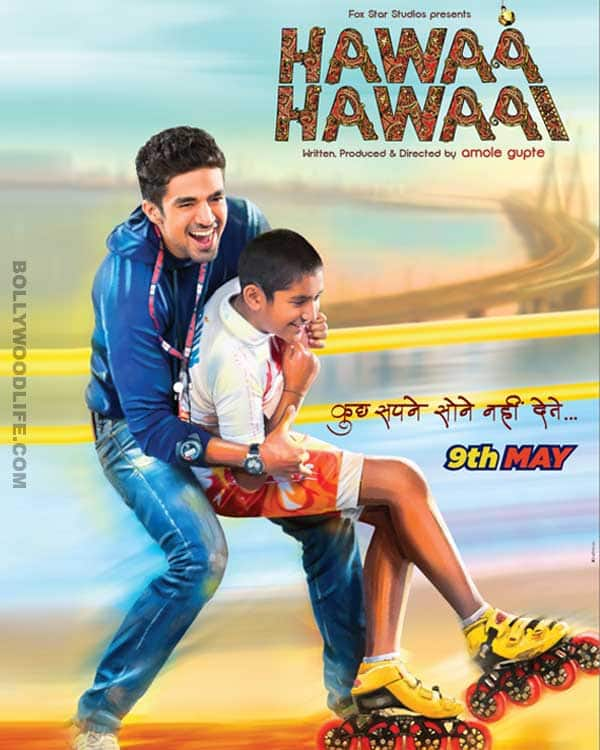Hawaa Hawaai
Story: Young, slumboy Arjun's only dream is to own a pair of shiny roller skates and be a champion of this sport-on-wheels. But is this little dream too big for his battered boots?
Review: Even slumdogs have dreams bundled away in their crumbling chawls, beneath piles of garbage and atop roofless homes. So what if it's not about millions and mansions, chateaus or chartered planes. Their sapna is made of strong stuff too. As kadak as the chai Arjun Harishchandra Waghmare (Partho), serves daily at the tea-stall for meager wages. Son of a cotton-farmer, he's uprooted from the village after his baba's shocking death, to the slums of Mumbai. Here, he toils long hours to support his family. One evening he witnesses a skating coach, Lucky (Saqib), eagerly training a group of privileged kids. He's besotted by a pair of shiny roller-skates and thereon, this Dharavi boy is on a dream-roll. His adorable buddies (poor kids with 'XL'-sized hearts) Gochi, Bhura, Abdul and Murugan share his dream of "wheel balance ka khel", making his passion their own. On seeing his talent and tenacity, Lucky finds a new goal - to make Arjun a champ. But will his sapna (riding high on his hand-made, red and gold wheels - called 'Hawaa Hawaai') smoothly make it to the finish line?
Amol Gupte's story is soulful, heart-breaking and hopeful - moving you from tears to deep-thought. He skillfully creates a portrait of the lives of deprived children - with profundity and playfulness. The child-like chemistry the kids share is delightful (whether it's bonding over left-over butter chicken or skate-shopping with thirty bucks). It's often stretched and over-dramatized, yet, the story is so heart-warming that the flaws seem like unnecessary details before a climax (however predictable), that's fulfilling. Gupte's children are pure gems - Partho's brilliance wins you over, backed by the rest of the bachchas who're incredibly talented. Saqib is terrific as a coach with an indefatigable spirit and Neha marvels with a motherly act.
'HH''s inspiring story is for children, for the child in all of us and for adults who need to wake up to dream again.
Review: Even slumdogs have dreams bundled away in their crumbling chawls, beneath piles of garbage and atop roofless homes. So what if it's not about millions and mansions, chateaus or chartered planes. Their sapna is made of strong stuff too. As kadak as the chai Arjun Harishchandra Waghmare (Partho), serves daily at the tea-stall for meager wages. Son of a cotton-farmer, he's uprooted from the village after his baba's shocking death, to the slums of Mumbai. Here, he toils long hours to support his family. One evening he witnesses a skating coach, Lucky (Saqib), eagerly training a group of privileged kids. He's besotted by a pair of shiny roller-skates and thereon, this Dharavi boy is on a dream-roll. His adorable buddies (poor kids with 'XL'-sized hearts) Gochi, Bhura, Abdul and Murugan share his dream of "wheel balance ka khel", making his passion their own. On seeing his talent and tenacity, Lucky finds a new goal - to make Arjun a champ. But will his sapna (riding high on his hand-made, red and gold wheels - called 'Hawaa Hawaai') smoothly make it to the finish line?
Amol Gupte's story is soulful, heart-breaking and hopeful - moving you from tears to deep-thought. He skillfully creates a portrait of the lives of deprived children - with profundity and playfulness. The child-like chemistry the kids share is delightful (whether it's bonding over left-over butter chicken or skate-shopping with thirty bucks). It's often stretched and over-dramatized, yet, the story is so heart-warming that the flaws seem like unnecessary details before a climax (however predictable), that's fulfilling. Gupte's children are pure gems - Partho's brilliance wins you over, backed by the rest of the bachchas who're incredibly talented. Saqib is terrific as a coach with an indefatigable spirit and Neha marvels with a motherly act.
'HH''s inspiring story is for children, for the child in all of us and for adults who need to wake up to dream again.





